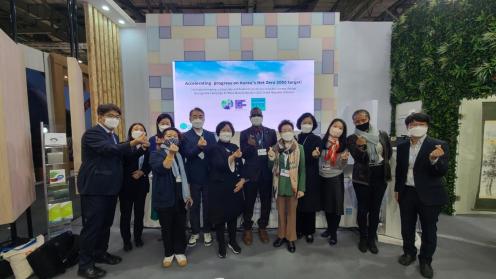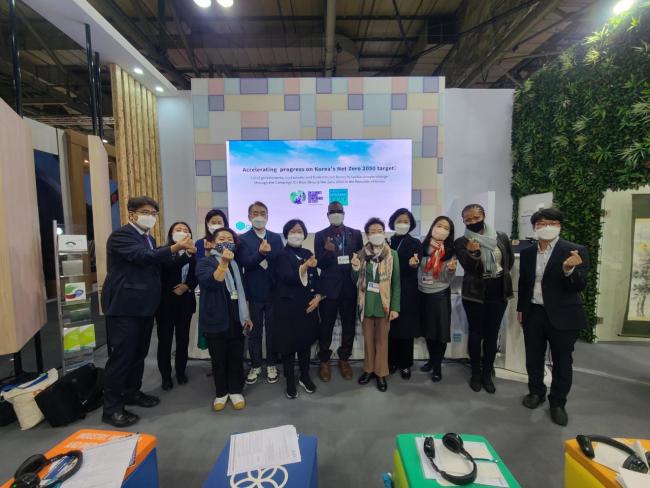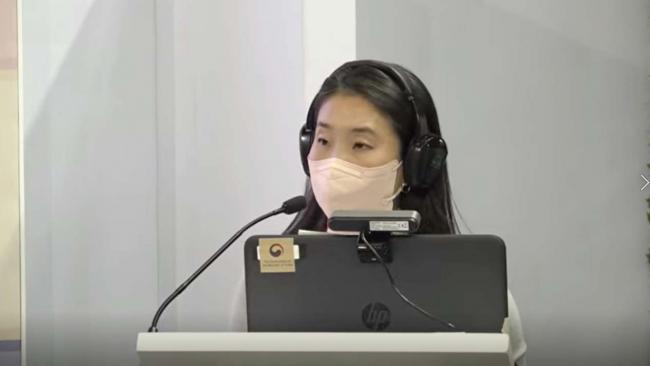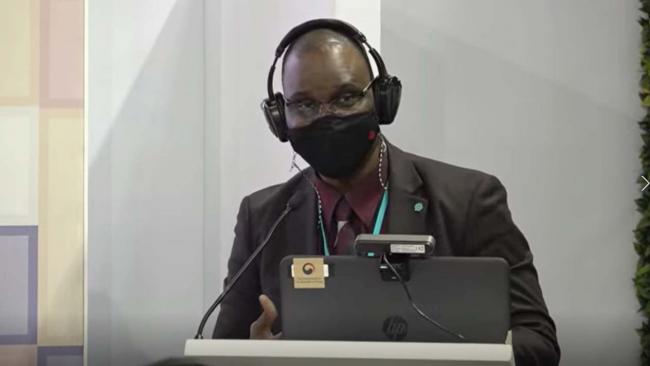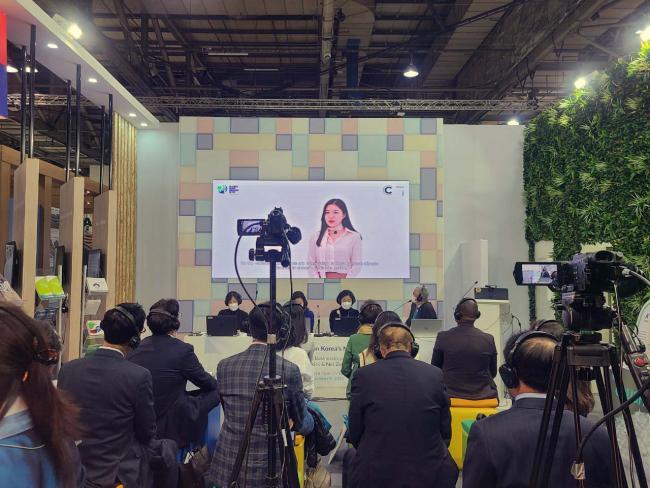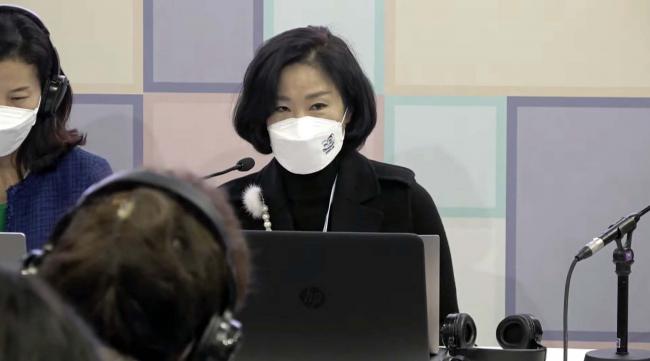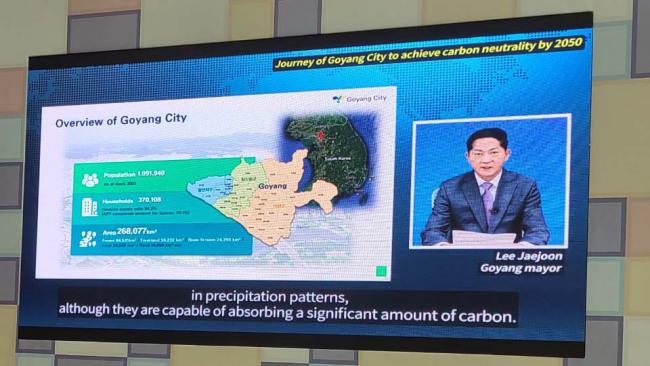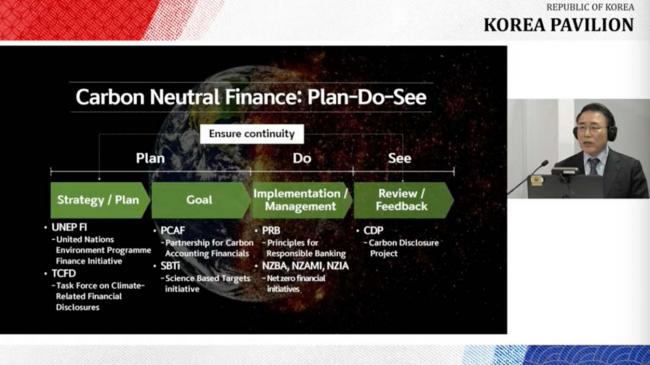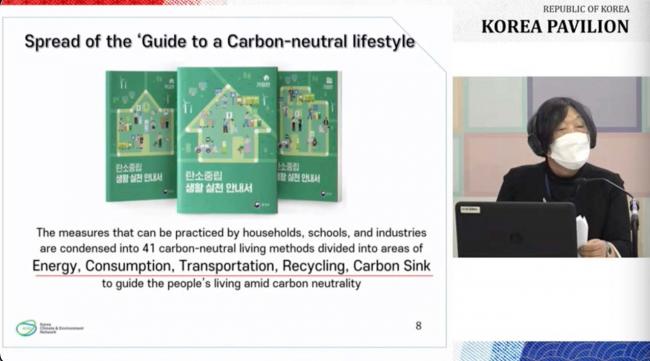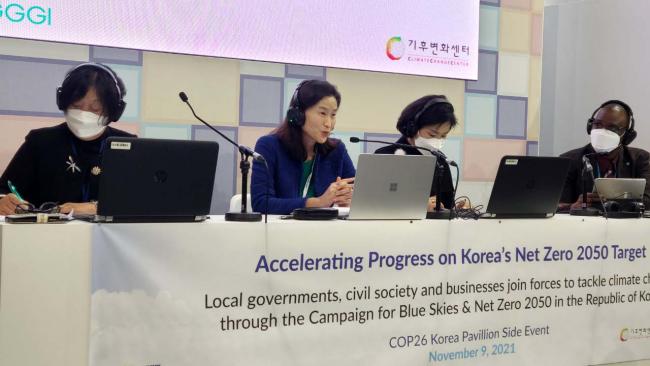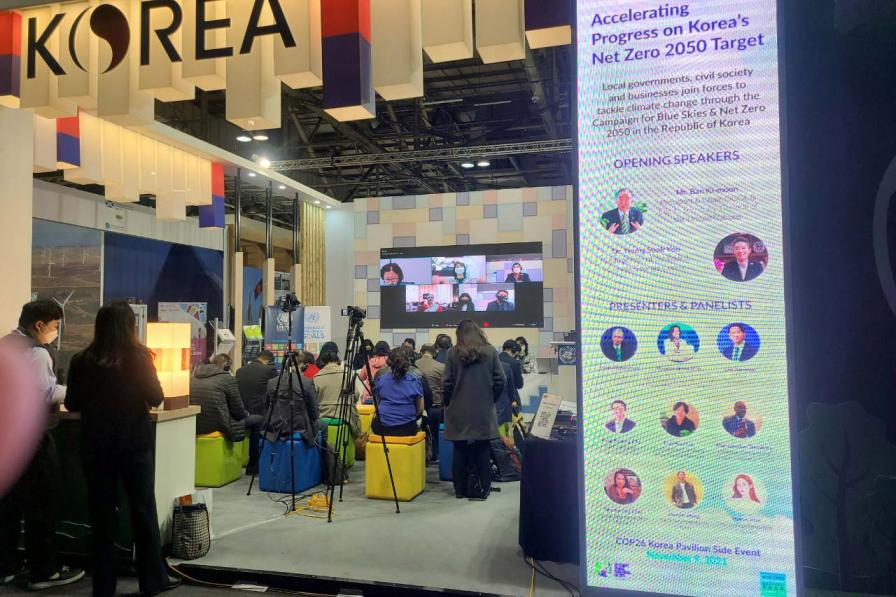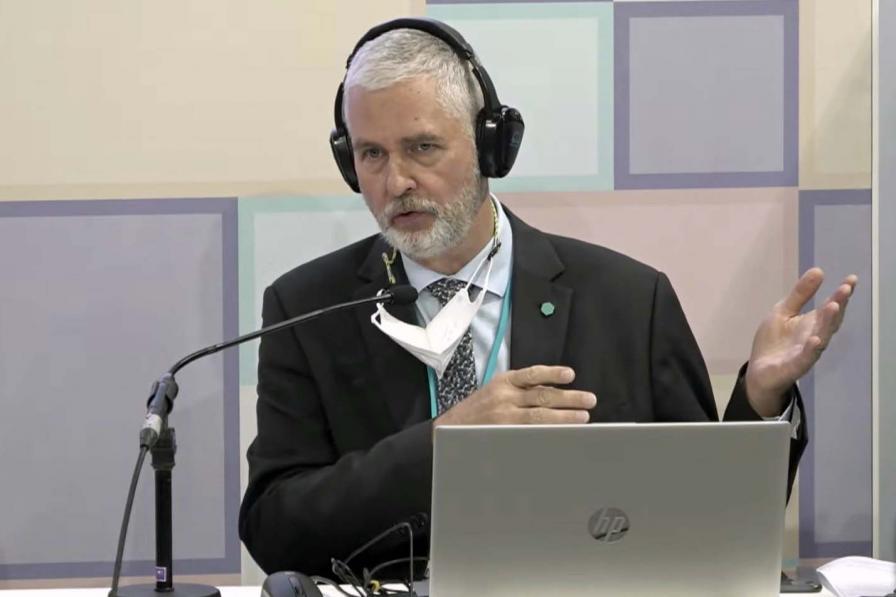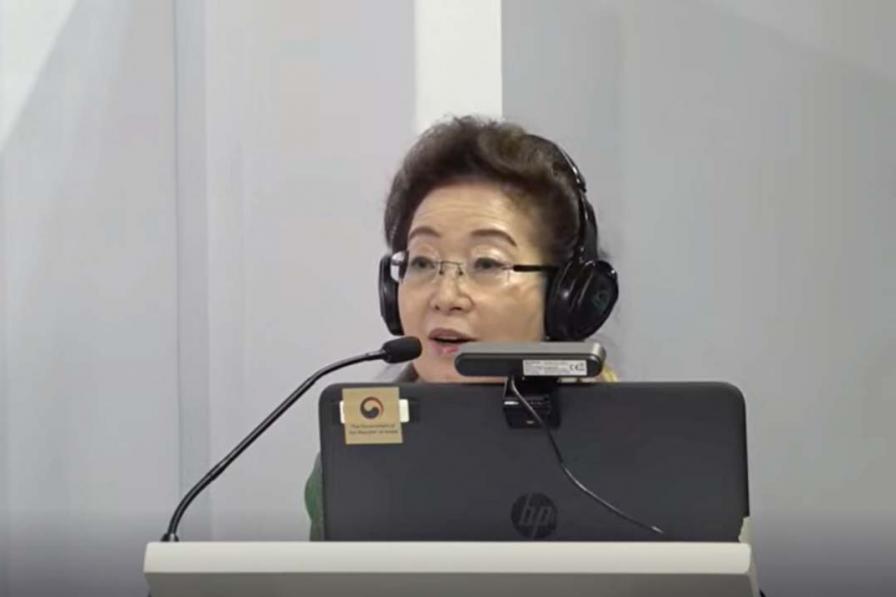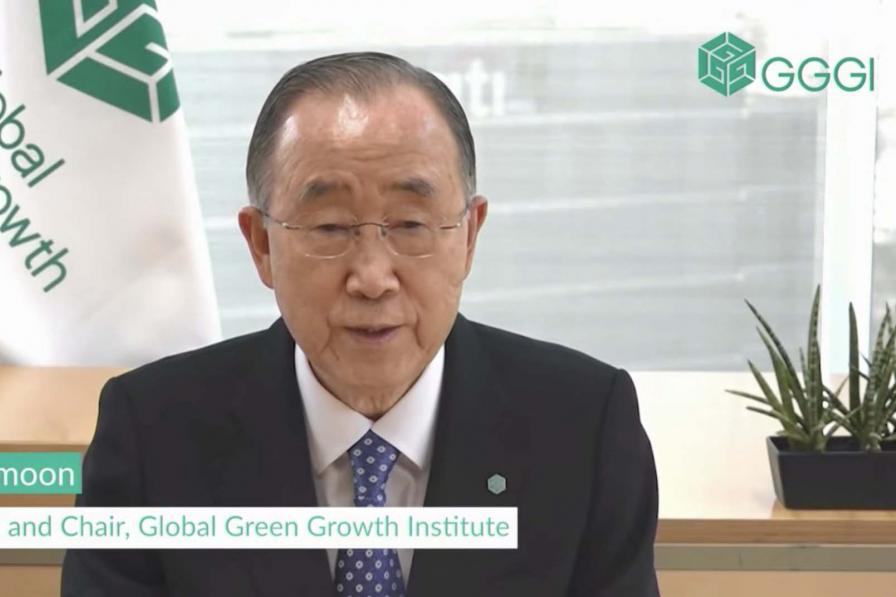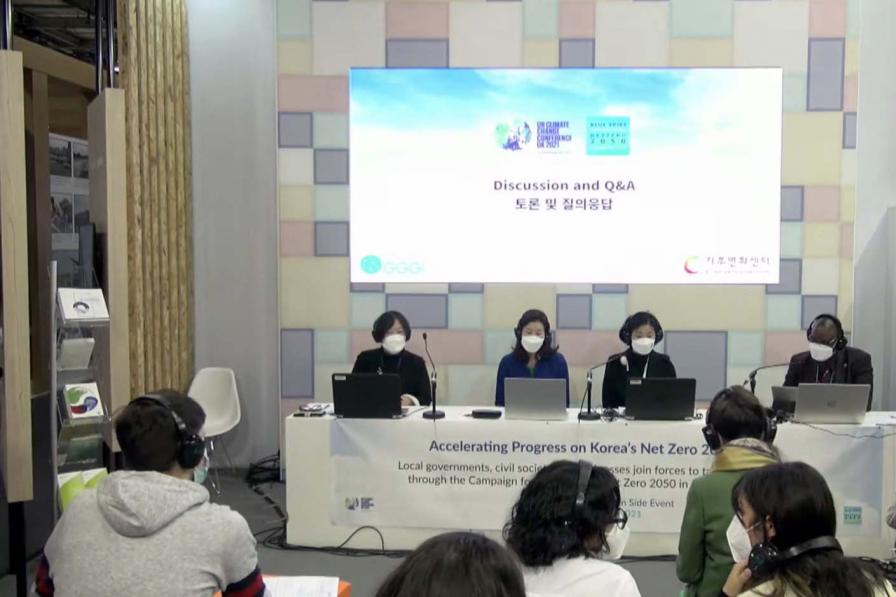Accelerating Progress on Korea’s Net Zero 2050 Target
How can we simultaneously reduce pollution while achieving net-zero carbon emissions by 2050? Linking the visual of “blue skies” and Korea’s net zero 2050 target guided this question that non-state actors unpacked during this side event. Speakers ranged from former UN Secretary-General Ban Ki-moon to youth to representatives from the financial sector and civil society. Key messages that emerged focused on:
- what actions would catalyze green finance and increase official development assistance (ODA);
- how linking pollution and carbon emission reductions can accelerate progress;
- the importance of listening to the voices of the future generation of leaders;
- the role of cities in reducing carbon emissions through setting their own targets and tracking implementation of their own plans to address climate change; and
- the innovative initiatives of Korean civil society organizations to introduce and adapt to carbon-free living.
The event was hosted at the Korea Pavilion and organized by the Global Green Growth initiative (GGGI) and the Climate Change Center (CCC), who together serve as the Secretariat for the Blue Skies and Net Zero 2050 Campaign, which serves as a platform to demonstrate support for the Korean Government to announce a net zero emissions target by 2050.
Recalling how the COVID-19 pandemic has disrupted the world and the climate process, Ban Ki-moon, President and Chair, GGGI, and former UN Secretary-General delivered opening remarks via video. “We are far from doing enough!” were the words with which Ban called for more climate finance and capacity building to enable all countries to achieve sustainable development. He emphasized three crucial building blocks to achieve this: achieving net zero carbon emissions; catalyzing green finance; and increasing green ODA.
Young Sook Yoo, Chairperson of the Board, CCC, noted the large number of people attending COP 26 is an indication of the global commitment and seriousness with which governments are approaching climate change. Regarding civil society support for all climate initiatives, she highlighted that:
- civil society should be active participants to lead the transition to net zero;
- civil society should put pressure on government, public institutions, and businesses to establish a climate budget for implementing the Korean Green New Deal and carbon neutrality; and
- moving together towards a more sustainable and inclusive society, while seeking a fair and just green transition, is imperative.
Moderator and Director, Division for Governance, Strategies, Partnerships & Communications, GGGI, Mahamadou Tounkara, introduced Frank Rijsberman, Director-General, GGGI, who applauded the Republic of Korea’s Blue Skies and Net Zero 2050 Campaign initiative to upscale its role in reducing carbon emissions. He encouraged the country to share its experiences with other countries. As key objectives, he noted raising public awareness, demonstrating support through decisive climate action that commits to net-zero 2050 targets, facilitating collaboration among all actors, and enabling a green recovery from the COVID-19 pandemic. He highlighted recent GGGI activities, suggesting three that could support the Campaign, including nominating a Campaign Champion or Goodwill Ambassador, collaborating in organizing joint global events, and allowing the use of logos in promotional materials.
Representatives from U-Savers, a youth climate activist organization in the Republic of Korea, then spoke via video. Jaemin Jeong, Yeomyeong Choi, and Yewon Kim shared their personal experiences of engaging with carbon neutrality. Jeong won a novel contest about a carbon-neutral future in 2050, thereby stimulating his novel’s readers to start the conversation about changing their lives to reduce carbon emissions. Using polar bears to illustrate and educate young children about climate change’s impact on Arctic glacier melt, Choi said education can bridge the diverging climate interests and conflicts between generations. Kim elaborated on the role of youth groups, such as U-Savers and New Ways, and the benefits of youth participation in events, such as the Tripartite Environment Ministers Meeting between the Republic of Korea, China and Japan, where they are able to express their opinions on climate policies. He said such fora enable young people to inform and influence others.
The COP 26 Presidency’s key phrases related to climate change action—coal, cars, cash and trees—were echoed by Hyoeun Jenny Kim, Ambassador and Deputy Minister for Climate Change, Ministry of Foreign Affairs, Republic of Korea. She said during COP 26, countries will need to decide when they will phase out coal and combustion engine cars, demand finance, and determine what they will do to stop deforestation.
On the role of local governments in realizing carbon neutrality by 2050, Lee Jae-joon, Mayor, Goyang City, in a video message, reflected on policies implemented by his city of 1.09 million citizens, which involved developing a greenhouse gas reduction plan that includes six categories, 17 strategies, 54 goals and 92 tasks. He said all of these were geared towards renewing the city’s commitment to carbon neutrality through green transportation, renewable energy, green and low carbon city spaces, and a fair and carbon neutral society.
Representing the investment and finance sector, Yong-Byoung Cho, CEO, Shinhan Financial Group, spoke about how to mobilize climate finance during the coming decades focused on global carbon neutrality, and shared his company’s slogan: “do the green thing, do the right thing for a wonderful world.” On how the financial sector can fulfil its role, he suggested starting by measuring and monitoring the sector’s progress.
On the role of civil society groups in helping to achieve Korea’s net-zero target, Eun Heui Lee, CEO, Korea Climate and Environment Network, voiced concern at the emission reduction levels across the world, saying public-private cooperation in the non-industrial sector is crucial to achieve greater reductions. She described the Guide to a Carbon-Neutral Lifestyle, developed to help households, schools and industries practice 41 carbon-neutral methods to guide people’s living amid carbon neutrality.
On implementing the Shinhan Bank’s carbon neutrality plan, Jiwoo Choi, Chief Risk and Sustainability Officer, Shinhan Bank, London, emphasized the need to ensure climate finance is being mainstreamed and profit incentives will be aligned with carbon emission targets.
Partners interested in joining the Campaign are invited to email: communications@gggi.org
Contact
Hee Kyung Son, Communications Lead, GGGI | h.son@gggi.org
More Information
Global Green Growth Institute (GGGI)
To receive free coverage of global environmental events delivered to your inbox, subscribe to the ENB Update newsletter.
